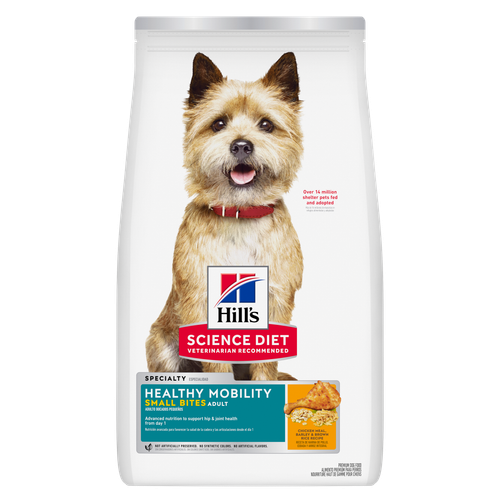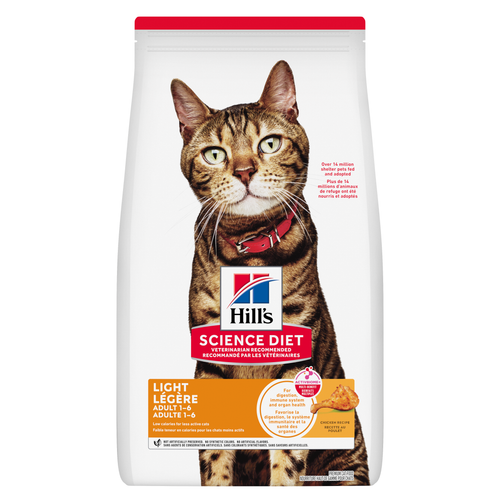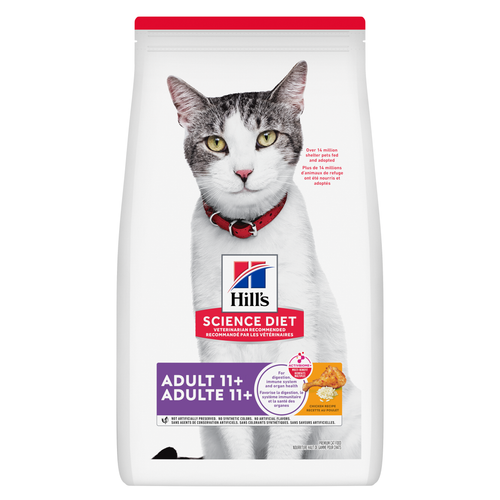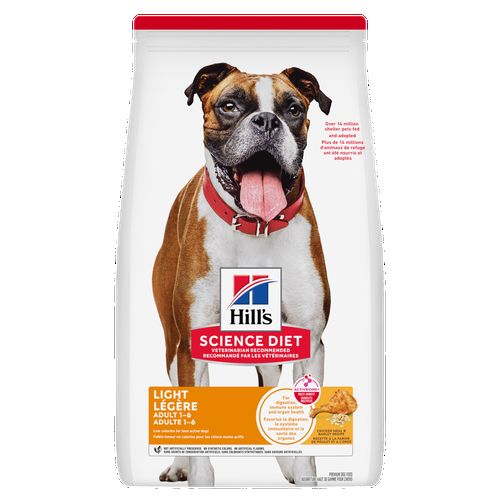
-
Find the right food for your petTake this quiz to see which food may be the best for your furry friend.Find the right food for your petTake this quiz to see which food may be the best for your furry friend.Featured products
 Adult Healthy Mobility Small Bites Chicken Meal, Barley & Brown Rice Recipe Dog Food
Adult Healthy Mobility Small Bites Chicken Meal, Barley & Brown Rice Recipe Dog FoodAdvanced nutrition to support hip & joint health from day 1
Shop Now Adult Sensitive Stomach & Skin Small & Mini Chicken Recipe Dog Food
Adult Sensitive Stomach & Skin Small & Mini Chicken Recipe Dog FoodHill's Science Diet Sensitive Stomach & Skin Small & Mini dry dog food is tailored nutrition for Small & Mini dogs while being gentle on stomachs. Nourishes skin & promotes a lustrous coat.
Shop Now Adult Light Large Breed Chicken Meal & Barley Recipe Dog Food
Adult Light Large Breed Chicken Meal & Barley Recipe Dog Food18% lower calories vs. Science Diet Large Breed Adult
Shop NowFeatured products Adult Light Chicken Recipe Cat Food
Adult Light Chicken Recipe Cat Food20% lower calories vs. Hill's Science Diet Adult
Shop Now Adult Healthy Cuisine Seared Tuna & Carrot Medley Cat Food
Adult Healthy Cuisine Seared Tuna & Carrot Medley Cat FoodDelicious seared tuna paired with tender carrots in a mouthwatering sauce
Shop Now Adult 11+ Chicken Recipe Cat Food
Adult 11+ Chicken Recipe Cat FoodSupports brain health & beautiful fur. Helps keep immune system, heart & kidneys healthy.
Shop Now -
Dog
- Dog Tips & Articles
-
Health Category
- Weight
- Food & Environmental Sensitivities
- Urinary
- Digestive
- Joint
- Kidney
- Dental
- Cancer
-
Life Stage
- Puppy Nutrition
- Adult Nutrition
- Senior Nutrition
Cat- Cat Tips & Articles
-
Health Category
- Weight
- Skin & Food Sensitivities
- Urinary
- Digestive
- Kidney
- Dental
- Stress
- Cancer
-
Life Stage
- Kitten Nutrition
- Adult Nutrition
Featured articles Antioxidants
AntioxidantsUnderstand the importance of antioxidants in your dog or cat's food, and how they can help protect your pet and keep them healthy.
Read More Water
WaterDiscover why water is the most important nutrient for your dog or cat to live a healthy life. Find out how much water your pet should consume each day.
Read More Importance of DHA in your Pet's Food
Importance of DHA in your Pet's FoodLearn about DHA, Docosahexaenoic Acid, a natural omega-3 fatty acid that is essential in the development of the brain and nervous system in cats & dogs.
Read More -


Strong smells are nothing new for dog parents and their fur kids. Not only do our canine friends have a strong sense of smell, but they also can be quite stinky themselves, and one of those smells could be similar to opening a bag of salty snacks. No, it's not your imagination. If you were just thinking that your dog smells like corn chips, you're not alone!
But, how can a dog or a dog's feet smell like corn chips? If you noticed this with your pet, you may be wondering why it's happening and if there is anything you can do to lessen that chippy smell. More importantly, is this distinctive scent something to worry about?

Why Do Dogs' Paws Smell Like Corn Chips?
In a video for National Geographic, veterinarian Dr. Courtney Campbell explains that dogs have what are called eccrine glands on their paw pads and noses. "They secrete a little bit of fluid just to keep the skin moist and supple. And sometimes, if there's bacteria that grows in there, or debris, it can smell like...corn chips."
Which means, if your dog smells a bit off, there's no need to be alarmed. This is a completely normal occurrence, and most likely there is no reason to bring him to the vet.
Bacteria
Bacteria is one of the biggest culprits that can lead to smelly feet. Think about all the different things your dog's paws touch on a daily basis, from the kitchen floor that needs mopping, to the dirty driveway to who knows what in the yard or on sidewalks. There are many ways that bacteria gets onto your pet's paws or the hair surrounding them. When it thrives there, your pet's paws may start to stink.
Sweat
Let's think about how dogs sweat. Unlike humans, your furry friends release heat through their paws as well as when they're panting. Dogs do sweat a small amount, but it's mainly though their paws and is less efficient than human sweating for cooling down, says the American Kennel Club. Because the areas surrounding the paws are covered with fur, that fur gets damp and becomes a spot where bacteria can breed.


Tasty Tips

Debris
Did your dog step on some food, waste, or anything else? Debris alone has the potential to create its own funky smell, but if something is embedded into your dog's hair or paws and the eccrine glands are secreting fluid, expect a smell to come from that area.
Is It Just His Feet That Smell?
Most people who admit that their furry friend smells like corn chips believe the issue comes from his feet. The face is also often a culprit, however, especially if your pet has deep folds in his skin where bacteria can hide. Some people even claim that their dog's entire body smells, but if that's the case, it's best to speak to a vet to make sure there aren't any other underlying medical issues amplifying the smell.
Get Your Pet to the Vet
Just wondering "Why do dogs smell like corn chips?" doesn't mean you need to rush your pet to the vet after the first sniff, but you may want to consider making an appointment if the smell is overwhelming or you need help planning a course of treatment. There are other conditions that may be exacerbating the issue, such as a significant yeast or fungal infection, an overgrown toenail or a foreign body like a stick or stone irritating your pup's paw pads. These would all require treatment from a trained professional to fix the problem and treat the smell.
Most of the time the corn chips smell is nothing to worry about, but if you're concerned, a trip to the vet will help ease your fears.


Erin Ollila believes in the power of words and how a message can inform—and even transform—its intended audience. Her writing can be found all over the internet and in print, and includes interviews, ghostwriting, blog posts, and creative nonfiction. Erin is a geek for SEO and all things social media. She graduated from Fairfield University with an M.F.A. in Creative Writing. Reach out to her on Twitter @ReinventingErin or learn more about her at http://erinollila.com.
Related products

Hill's Science Diet Sensitive Stomach & Skin Small & Mini dry dog food is tailored nutrition for Small & Mini dogs while being gentle on stomachs. Nourishes skin & promotes a lustrous coat.

18% lower calories vs. Science Diet Large Breed Adult

18% lower calories vs. Science Diet Adult

Advanced nutrition to support hip & joint health from day 1
Related articles

Learn basic steps & precautions for treating a cut on your dog, including what you can put on the cut, and when you should take them to the vet.

Discover how the field of dog science is giving us more and more insights into the inner workings of our furry best friends.

Learn how dogs with sensitive skin can have special dietary needs, how they can develop over time in a healthy dog, and how Hill's dog food can help.

Your dog's coat and skin are a big part of your dog's overall health. Ensure you keep your dog's coat healthy, by following these simple tips.

Put your dog on a diet without them knowing
Our low calorie formula helps you control your dog's weight. It's packed with high-quality protein for building lean muscles, and made with purposeful ingredients for a flavorful, nutritious meal. Clinically proven antioxidants, Vitamin C+E, help promote a healthy immune system.
Put your dog on a diet without them knowing
Our low calorie formula helps you control your dog's weight. It's packed with high-quality protein for building lean muscles, and made with purposeful ingredients for a flavorful, nutritious meal. Clinically proven antioxidants, Vitamin C+E, help promote a healthy immune system.

